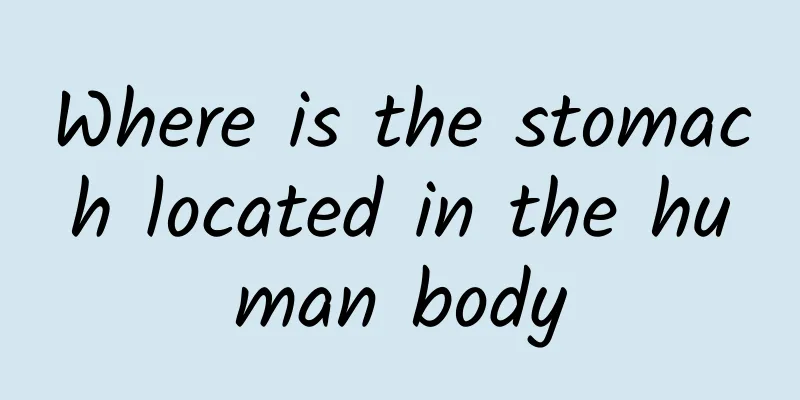Where is the stomach located in the human body

|
The stomach is the source of qi and blood for the five internal organs. Food enters the mouth, passes through the esophagus and reaches the stomach. The fine substances, namely nutrients, first come out of the stomach and then reach the upper and lower parts of the body and are distributed to the five internal organs. The human body's qi, which is often mentioned in traditional Chinese medicine, originates from the essence of water and grain, is developed and dispersed by the spleen and stomach, and ultimately nourishes the internal organs, limbs and bones. It can be seen that the stomach plays an important role in life activities. So where is the stomach in the human body? Most of the stomach is located in the left hypochondrium , and a small part is located in the epigastric area. The anterior wall of the stomach is close to the left lobe of the liver on the right side and adjacent to the diaphragm on the left side, and is covered by the left accessory arch. The anterior wall of the stomach between the left lobe of the liver and the left costal arch is directly attached to the anterior abdominal wall. The posterior wall of the stomach is adjacent to the pancreas, transverse colon, left kidney and left adrenal gland, and the fundus of the stomach is adjacent to the diaphragm and spleen. The positions of the cardia and pylorus are relatively fixed, with the cardia located on the left side of the 11th thoracic vertebra and the pylorus near the right side of the 1st lumbar vertebra. The greater curvature of the stomach is located low, with its lowest point generally at the umbilical plane. So where is the stomach in the human body? The position of the stomach varies greatly depending on body shape, body position, whether the stomach is empty or full, etc. The stomach is higher in short and fat people, while it is lower in tall and thin people. The gastric wall muscle tension is low, and when standing after a full meal, the lowest point of the greater curvature of the stomach can reach the level of the iliac crest. The stomach is located below the diaphragm and in the upper part of the abdominal cavity. Traditional Chinese medicine divides it into three parts: upper, middle, and lower. The upper part of the stomach is called Shangwan, including the cardia; the middle part is called Zhongwan, which is the body of the stomach; and the lower part is called Xiawan, including the pylorus. The main physiological function of the stomach is to receive and digest food and drink. The stomach is in harmony with the spleen and is the exterior and interior of the stomach. The stomach is responsible for receiving and digesting food and water. Receiving means accepting and accommodating. Fermentation means that food has undergone initial digestion in the stomach to form chyme. Food enters the mouth, passes through the esophagus, and is stored in the stomach, so the stomach is called the "Taicang" and the "sea of food and water." The body's physiological activities and the production of qi, blood, and body fluids all rely on the nutrition of food, so the stomach is also called the "sea of food, qi, and blood." "Suwen Yuban" said: "The source of human energy is food; the place where food is poured into is the stomach; the stomach is the sea of food, water, qi and blood." Food and water stored in the stomach are fermented by the stomach and then passed to the small intestine for further digestion and absorption. If this function of the stomach is impaired, symptoms such as loss of appetite, poor food intake, indigestion, and epigastric bloating and pain may occur. The stomach's function of receiving and digesting food and grain must be coordinated with the spleen's function of transporting and transforming food and grain, so the spleen and stomach's digestive and absorption function of food and grain can be summarized as "stomach qi". The strength or weakness of stomach qi is directly related to the life activities and survival of the human body. Therefore, the spleen and stomach are also called the "acquired foundation" of human beings. The stomach is responsible for descending, and descending means that after food is received and fermented by the stomach, it must descend into the small intestine for further digestion and absorption. Therefore, the stomach is responsible for descending, and descending is harmony. In the Zang-Fu theory, the descending function of the stomach also includes the function of the small intestine transporting food residues to the large intestine, and the function of the large intestine transmitting and digesting waste. If the stomach is out of harmony and descending, it will affect appetite and cause bad breath, abdominal distension and pain, etc.; if the stomach qi goes upward, belching, acid regurgitation, hiccups, nausea, vomiting, etc. will appear. |
<<: Causes of sweating in various parts of the body
>>: Where should I massage when my child has a fever?
Recommend
What causes itchy instep?
Athlete's foot, which is usually caused by fu...
Causes of Thick Toenails
Thick toenails may be caused by toenail malnutrit...
What can urine tests detect? Once diagnosed, treatment must be given as soon as possible.
Urine test is a relatively common examination met...
How to treat the skin disease tinea pedis
Tinea pedis is a skin damage caused by fungal inf...
The efficacy and function of Pan Gaoshou Guilinggao
It is said that grass jelly was introduced into f...
Why does the instep of a pregnant woman itch?
There are many reasons why pregnant women experie...
How to drain plasma cell mastitis?
Plasma cell mastitis has a serious impact on many...
Korean seamless eye opening
Korean-style seamless canthoplasty is a common pl...
Tips for losing your sense of taste when you have a cold
We all know that headaches, colds and fevers are ...
Can I have sex if I have a broken bone?
There is an old saying that it takes a hundred da...
Genital warts incubation period
As we all know, genital warts are a reproductive o...
I didn't sweat before, but now I sweat
Some friends used to sweat less or not at all in ...
What causes baby deformity?
There are many reasons that lead to baby deformit...
Why does my anus hurt?
People's anus is commonly known as the anus, ...
Burn wound pain one week
People cannot predict when and what kind of harm ...









